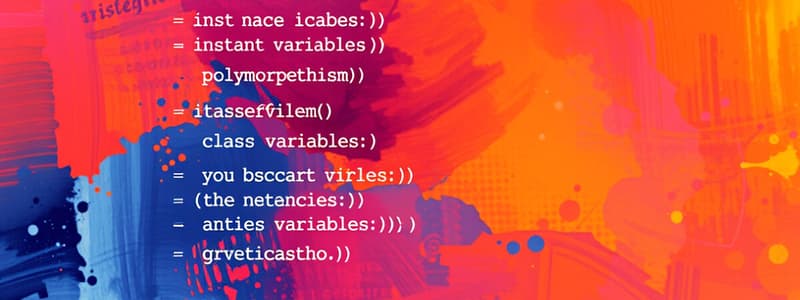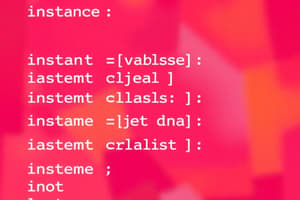Podcast
Questions and Answers
What is an instance variable?
What is an instance variable?
is owned by a particular instance of a class and no other
What is a polymorphic method?
What is a polymorphic method?
has a single header but different bodies in different classes
What is a class variable used for?
What is a class variable used for?
data that all instances of a class have in common
How is class A's init method called in class B?
How is class A's init method called in class B?
When does an object's lifetime end?
When does an object's lifetime end?
What is the name used to refer to the current instance of a class?
What is the name used to refer to the current instance of a class?
What is the purpose of the init method in a class?
What is the purpose of the init method in a class?
A method definition must have at least one parameter name, called self.
A method definition must have at least one parameter name, called self.
What is the easiest way to save objects to permanent storage?
What is the easiest way to save objects to permanent storage?
What is the scope of an instance variable?
What is the scope of an instance variable?
What does a simple class consist of?
What does a simple class consist of?
In addition to methods, what does a class include?
In addition to methods, what does a class include?
What does a method contain?
What does a method contain?
Some standard operators can be overloaded for use with new classes of objects.
Some standard operators can be overloaded for use with new classes of objects.
What is pickling?
What is pickling?
The try-except statement is used to catch and handle exceptions.
The try-except statement is used to catch and handle exceptions.
What are the three most important features of object-oriented programming?
What are the three most important features of object-oriented programming?
What are the benefits of encapsulation, inheritance, and polymorphism?
What are the benefits of encapsulation, inheritance, and polymorphism?
What is encapsulation?
What is encapsulation?
What is a data model?
What is a data model?
What is a view?
What is a view?
Flashcards
Instance Variables
Instance Variables
Specific to an individual class instance, not shared.
Polymorphism
Polymorphism
Methods with one header, different implementations across classes.
Class Variables
Class Variables
Data common to all instances of a class.
Self
Self
Signup and view all the flashcards
Purpose of __init__
Purpose of __init__
Signup and view all the flashcards
Pickling Process
Pickling Process
Signup and view all the flashcards
Exception Handling
Exception Handling
Signup and view all the flashcards
Key Features of OOP
Key Features of OOP
Signup and view all the flashcards
Encapsulation Functionality
Encapsulation Functionality
Signup and view all the flashcards
Data Model Definition
Data Model Definition
Signup and view all the flashcards
Role of a View
Role of a View
Signup and view all the flashcards
Class Variables
Class Variables
Signup and view all the flashcards
Object Lifetime
Object Lifetime
Signup and view all the flashcards
Object Persistence
Object Persistence
Signup and view all the flashcards
Structure of a Simple Class
Structure of a Simple Class
Signup and view all the flashcards
Method Composition
Method Composition
Signup and view all the flashcards
Operator Overloading
Operator Overloading
Signup and view all the flashcards
Simplifying Code Maintenance
Simplifying Code Maintenance
Signup and view all the flashcards
Class Components
Class Components
Signup and view all the flashcards
Scope of Instance Variables
Scope of Instance Variables
Signup and view all the flashcards
Method Definition
Method Definition
Signup and view all the flashcards
Study Notes
Instance Variables
- Instance variables are specific to an individual class instance and are not shared with other instances.
Polymorphism
- Polymorphic methods possess a single header but can have distinct implementations across different classes.
Class Variables
- Class variables retain data common to all instances of a class, allowing for shared information among them.
Class Initialization
- In subclassing, calling the superclass's
__init__method is done with the syntaxA.__init__(self)when the constructor expects no arguments.
Object Lifetime
- An object's lifetime concludes when it is no longer referenced, making it eligible for garbage collection.
Current Instance Reference
- The term
selfis utilized within class definitions to refer to the current object instance.
Purpose of __init__
- The
__init__method initializes instance variables to their starting values when an object is created.
Method Definition
- Every method defined in a class must include at least one parameter called
self, representing the instance.
Object Persistence
- To save objects permanently, the easiest method involves using the
picklefunction'sdumpfeature.
Scope of Instance Variables
- Instance variables are accessible throughout the entire class in which they are declared.
Structure of a Simple Class
- A simple class is structured with a header and a collection of method definitions.
Class Components
- Besides methods, classes include instance variables, which store data pertinent to each instance.
Method Composition
- Each method comprises a header that specifies its name and parameters, along with a body that contains executable statements.
Operator Overloading
- Certain standard operators can be overloaded, providing customized functionality for new object classes.
Pickling Process
- Pickling is the method of converting an object into a format suitable for saving to permanent file storage.
Exception Handling
- The
try-exceptstatement aids in managing exceptions that may arise during the execution of a block of statements.
Key Features of OOP
- Encapsulation, inheritance, and polymorphism are the trio of foundational principles in object-oriented programming.
Simplifying Code Maintenance
- These principles enhance the simplicity and maintainability of programming endeavors.
Encapsulation Functionality
- Encapsulation guarantees that access to an object's data is restricted to the methods defined within its class, promoting data integrity.
Data Model Definition
- A data model encompasses a collection of classes dedicated to managing the data attributes of a program.
Role of a View
- A view consists of classes that present information to users and manage their inputs, focusing on user interaction.
Studying That Suits You
Use AI to generate personalized quizzes and flashcards to suit your learning preferences.




